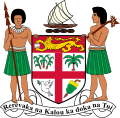| Attorney-General of Fiji | |
|---|---|
 Coat of arms of the Republic of Fiji | |
since 5 June 2024 | |
| Style | The Honourable |
| Reports to | Prime Minister of Fiji |
| Appointer | President of Fiji |
| Formation | 1872 |
| First holder | Robert Wilson Hamilton |
 |
|---|
The Attorney-General is a political and legal officer in Fiji.[1] The attorney-general is the chief law officer of the State, and has responsibility for supervising Fijian law and advising the government on legal matters. Like other members of the Fijian Cabinet, the attorney-general is appointed by the president on the advice of the prime minister.
According to the 2013 Constitution of Fiji, the attorney-general is required to be a registered legal practitioner in Fiji, with not less than fifteen years' post-admission legal practice, either in Fiji or internationally.[2] The attorney-general is a member of the Cabinet of Fiji,[2] and is normally expected to be a Member of Parliament. The Prime Minister may, however, choose an attorney-general from outside Parliament after determining there is no suitably qualified Member of Parliament who supports the Government. An Attorney-General who is not a Member of Parliament may sit in Parliament, but may not vote.[2]
The office of the attorney-general is the oldest surviving executive office in Fiji, having been established in the Kingdom of Fiji in 1872. It continued throughout Fiji's years as a British crown colony (1874–1970) and subsequently as the Dominion of Fiji (1970–1987) and republic (1987–present), with minimal modifications.
The attorney-general was the only Cabinet office, apart from that of the prime minister, specifically established by the 1997 Constitution, which required the attorney-general to be a member of either the House of Representatives or the Senate. A unique feature of the office was that except for voting rights (which could be exercised only in the chamber of which the attorney-general was officially a member), the attorney-general had the authority to participate in the business of both chambers of Parliament. This feature became redundant upon the adoption of the 2013 Constitution, which established a unicameral parliament.
- ^ "Welcome to the website of the Office of the Attorney-General". Office of the Attorney-General. © Copyright 2005-2008, Office of the Attorney-General. Archived from the original on 24 October 2015. Retrieved 28 October 2015.
- ^ a b c "Constitution of the Republic of Fiji" (PDF). electionsfiji.gov.fj. p. 55. Archived from the original (PDF) on 23 September 2015. Retrieved 28 October 2015.
